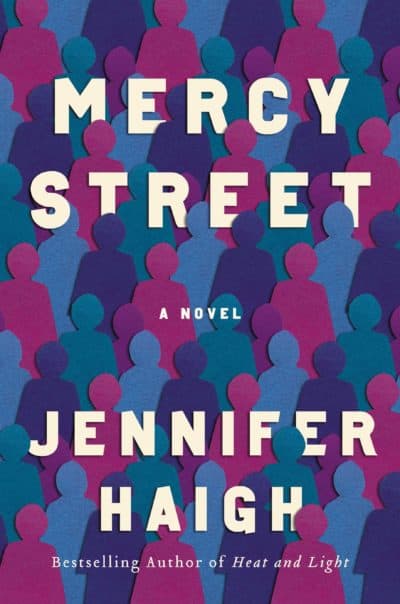Advertisement
Review
Author Jennifer Haigh chronicles both sides of the abortion debate in 'Mercy Street'
When a novelist takes on a big, divisive issue, there’s a risk that the result will read like a polemic. This is not the case with Jennifer Haigh’s fiction. Her previous novel, “Heat and Light,” about the ruinous effects of fracking on a rural Pennsylvania town, was not only well-researched, it contained multifaceted characters and storylines, qualities that landed it on numerous Best Books of 2016 lists.
Her new novel, “Mercy Street” (out Feb. 1), is about the charged and — given the recent state and Supreme Court rulings — very timely issue of abortion. “Mercy Street” joins other novels that, in recent years, have examined this topic from different viewpoints, such as Joyce Carol Oates’ philosophical “A Book of American Martyrs,” Leni Zumas’ dystopian “Red Clocks” and Brit Bennett’s nuanced “The Mothers.”
Set in Boston in the winter and spring of 2015, “Mercy Street” offers a complex portrayal of the many ways a woman arrives at her decision to continue or terminate her pregnancy, while also capturing the broader political and cultural tumult that preceded the 2016 presidential campaign. To do this, Haigh chronicles some pivotal events in the lives of people on both sides of the abortion issue. This is a novel that feels created with a fine, small-size gauge: the four main characters are not national leaders or even people who wield a fraction of that power.

Claudia works at Mercy Street, a women’s health clinic near Boston Common, where she manages hotline volunteers and does in-person informational counseling. (The clinic’s official name is Women’s Options; Bostonians just call it Mercy Street.) At 43, Claudia is most happy in relationships with men who want as much space as she does. Raised in a hardscrabble Maine town by a single mother (like “many poor people, she’d been raised by a teenager”), she often sees her mother in the younger clients, the pregnant girls “half-educated, without resources.”
Anthony and Victor are bumbling, menacing foot soldiers on the fringe of the anti-abortion movement. Timmy is a weed dealer whose life intersects with the others in progressively surprising ways. In “Mercy Street,” Haigh has created a world that revolves on an axis of random yet consequential events, a novel of smaller moments that only later seem significant.
If you lived in Greater Boston in 2015, you probably remember that year’s relentless nor’easters, which set records for snowfall amounts, school closings and miles of roads plowed. And yet, the start to that winter offered no hint of what would lie ahead; January was a month of dry, calm days.
Haigh, who lives in Boston, is the author of the short story collection “News from Heaven” and five previous novels. Her work has won awards including the PEN/Hemingway Award, the Massachusetts Book Award and the PEN New England Award in Fiction.
Haigh leavens the weather descriptions with evocative local color: from how Bostonians save parking spaces (with furniture) to, of course, the traffic. When Claudia is in her car, she sometimes muses that “Driving in Boston was like being inside a video game, a closed system with its own interior logic.”
Advertisement
Haigh also grounds the story in substantive legal and medical information, while also providing some social context. Claudia knows that callers to their hotline are seeking information only, because “By the time a woman Googled ‘abortion Boston’ …Her decision was already made.” Poignantly, most callers to the clinic are polite; even “those who’d been date-raped … were… reflexively eager to please.” After nine years at Mercy Street, Claudia also understands a woman’s heartbreak at ending a desired pregnancy due to an untenable medical condition, knowing that “names had been chosen…baby showers planned.”
She also knows that the protesters who stand outside the clinic would not acknowledge any of this, or that many women rely on the clinic for regular health appointments. Protesters had always been “a daily nuisance” kept 50 feet away; now, with changed laws, they come right to the front door to harass clients.

Even with a security guard and exterior security cameras, the office atmosphere at the clinic has grown increasingly tense. The way that different threats begin to accumulate against the clinic seems an echo of the gradual but lasting changes to many institutions that were previously unrestricted: schools, office buildings, places of worship. The new, fraught normal of American life.
Earlier in the winter, a suspicious package had been found in one of the clinic’s restrooms. Though it was harmless, Claudia found herself unable to sleep, and finally decided she needed some help to wind down. She turns to Timmy, a weed dealer and ex-marine with a thriving business out of his apartment; they forge a comfortable, situational friendship.
Anthony, one of Timmy’s other clients, is on long-term disability from a construction accident, and is in search of a purpose. He longs for what he sees as the glory days of Catholicism, when churches were packed to hear the Latin mass, and being Catholic was not “an easy laugh for the late-night comics.” Once a week, he joins other protesters at Mercy Street. For him, abortion is “a thing you were supposed to care about, like the national debt.”
That is not how Victor, Anthony’s online protest coordinator, feels about abortion. Known to Anthony only by his screen name “Excelior11,” Victor is a Vietnam vet and former long-haul trucker. He still listens to a lot of talk radio, whose far-right, resentment-filled views validate his own. He used to spend his retirement driving around the northeast, putting up homemade signs with messages like “ALL LIFE IS SACRED.” Although for Victor, just some life is sacred. He is outraged by ominous radio and internet stories of the many white women who choose to have just one baby, or none at all. Because of their selfishness, the white race will soon be “at the mercy of all the others.”
Victor has built a “Hall of Shame” website that displays photos of white women entering abortion clinics. It took just one request on 8chan for volunteers across the country to begin sending him photos to post on the site. Anthony is one of those volunteers.
Victor is having an impact on women’s health clinics across the country, all from his home computer in Pennsylvania. (In a case of overlapping fictional worlds, Victor is a stepbrother of a character in Haigh’s novel “Heat and Light.”)
These are two very different men, yet Victor and Anthony share traits that now seem familiar from news stories about white supremacist and other groups: They yearn for a mythical yesteryear when everyone knew their place in the world. They spend more time with strangers online than with anyone in real life. Unfortunately, because these two main characters have little in the way of an interior life, some of their passages can feel thin, even while the action is accelerating.
But overall, “Mercy Street” is an effective portrait of a hinge moment, when increasingly sophisticated technology has exponentially amplified bitterness fueled by widening economic and cultural divides. This is a novel of some big events and many small ones, minor moments that keep building on one other in convincing, haunting ways. “Mercy Street” shows how the resulting cumulative churn began to alter everyday life in fundamental ways.
Jennifer Haigh will discuss "Mercy Street" in a virtual event hosted by Harvard Book Store on Feb. 3. She will be in-person at Wellesley Books on Feb. 10.